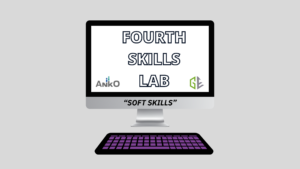"Always keep going, especially when you lose some motivation", an interview with Salvatore Bernardi.
Erasmus+ is the EU’s programme to support education, training, youth and sport all around Europe and offers mobility and cooperation opportunities for young people. So today in this interview we have Salvatore Bernardi who is the founder and president of the Non Governmental Organization in Italy called Eco Intercultura South. The organization provides opportunities for Italian residents to participate in youth exchanges, training courses and volunteering just to gain international experience and knowledge. Through his organization, he has created a platform for people to explore different cultures, learn new skills, and develop global perspectives. He is a strong believer in the power of education and international exchange for creating a better world. He is committed to making sure that everyone has access to the resources they need to reach their full potential.
The team of Geeconomy would like to thank him for taking the time to participate in the interview and providing us insights about his organization and Erasmus+ programs. We are grateful for having him share his inspiring story and his vision for a better future.
You can find more about the organization by following their social media:
Facebook: Eco Intercultura South
Instagram: @ecointercultura
1. First of all, can you tell us your educational and professional background so far?
S: Sure, I graduated in International relations in Bari University, then I completed my master’s degree in the same topic at the University of Siena. During my career I did one Erasmus studies in Warsaw, Poland at Collegium Civitas University and one Erasmus for traineeship at the Italian Consulate in Krakow, Poland. During University I always took part in political action at university level, I was part of the party Independent Students where we fight for the students rights. After I completed my masters I immediately founded my NGO and I started to work in my social business focusing on Erasmus projects.
2. What inspired you to develop your idea?
S: I think many people around me inspired me and continue to inspire me even today. Starting from some professors to colleagues, to the people working in Organizations that I like.
3. What’s your opinion on the importance of creativity in organizations?
S: In our type of organizations, creativity is crucial, without new ideas and new ways of doing things you can become bored after some time even if our job is quite dynamic. We always take inputs and new sources from what is happening in the world and we always try to make things better and improve our quality. What we offer is basically a service, and people that give us grants would not invest in us if we don’t change the topic of the projects and improve the quality of implementation.
4. What is your biggest professional achievement so far and why?
S: I think my biggest prof. achievements are the projects we’ve made in our local community, it was something new that was missing in the area. I really believe it gave and will give new resources, more work to the people living here and more opportunities for the youngsters, plus a more open mind to the world.
5. What is the hardest part of being an entrepreneur?
S: There are many hard parts. I think the beginning is always hard. It is difficult to be understood, you might feel judged because people don’t understand your vision and the business is not sustainable yet and losing motivation is very easy. After this first path I think there are still hard parts, especially in making your business economically sustainable but the achievements at that point are more satisfying than everything.
6. How have you grown personally from becoming a successful NGO leader?
S: Well, at the beginning I didn’t know I was one. I had my idea, I was trying to make the idea work and I finally made it, then I discovered that many people asked me to do an Erasmus project for young entrepreneurs at their Organizations and start ups, where you could apply through the erasmus platform with your idea of business and spend 6 months abroad learning at the hosting partner how to make your business a realization. I still did not apply for that, I think I will do it soon but there I understood I was already an entrepreneur and president of something called social business as an Organization.
7. How does your organization look different now vs. when you first started?
S: IT’S A LOT DIFFERENT! When I started I was alone in an ocean of doubts, then things started to become better and bigger, projects got approved, I learnt more things by doing them and became more professional. At the same time also my business was becoming more professional and expanding more and more. Something that really motivates me is actually that I don’t know where the top is and I am curious about it.
8. What qualities and skills do you think a project manager should have?
S: A lot of qualities but I will go with just three. First of all a project manager needs to have clear communication skills, so his/her communication needs to be precise and reach the person in a nice way, the manager will save time and hopefully will also appreciate it. Another quality is empathy. The manager needs to feel and understand the person in front of her/him and be a very good and active listener. Last but not least is intuition. This would help you in every situation, understand something before it happens or before the others is always a crucial aspect of every business
9. What are the day-to-day responsibilities you need to get done?
S: The responsibilities change day by day depending on the period of the year in our work. In February for example we always apply for grants and look for new partnerships, which plays a crucial aspect for the implementation of our projects. During the rest of the year we make projects as sending or hosting Organizations, or as freelancers and that’s how we get paid. I think the more you do the more you get and it is very nice to connect other businesses if you have more than one.

10. And finally, what advice would you like to give to someone that wants to start their own enterprise?
S: My advice is to always keep going, especially when you lose some motivation. Somehow the universe will show you if your intuition was good or not.






